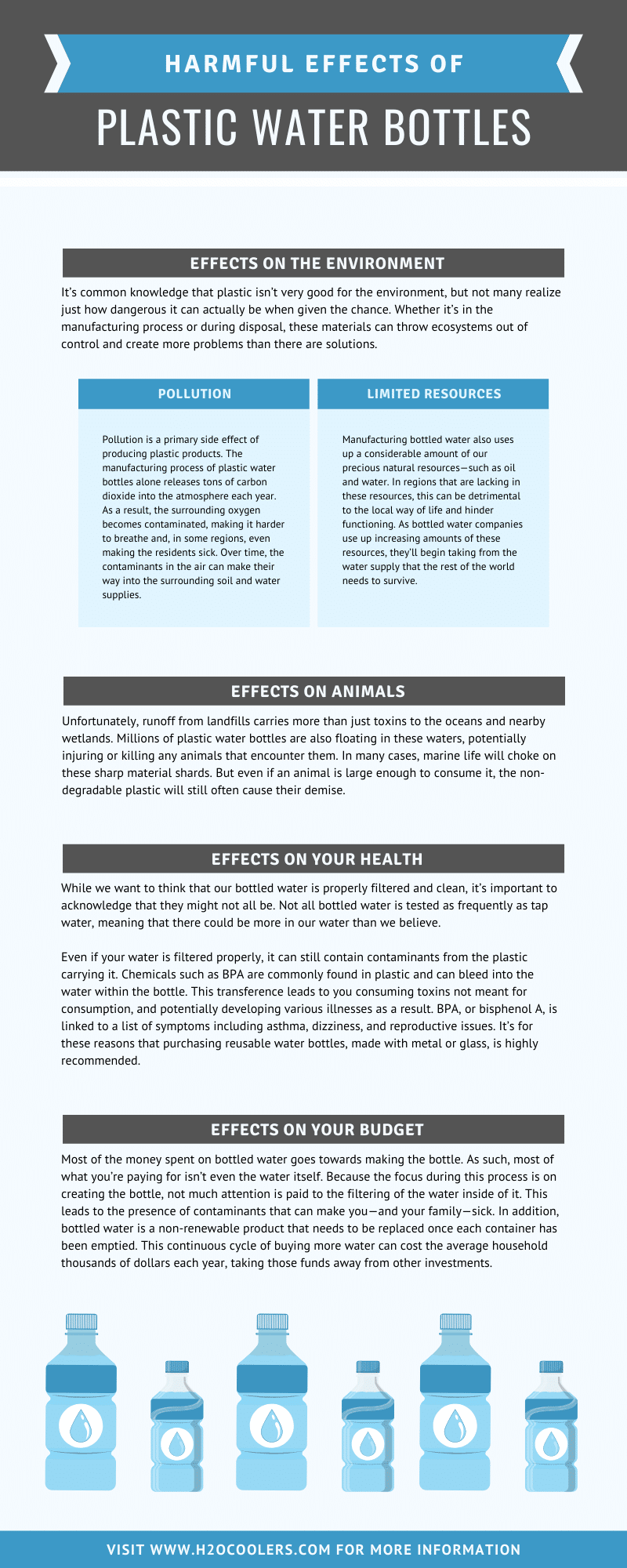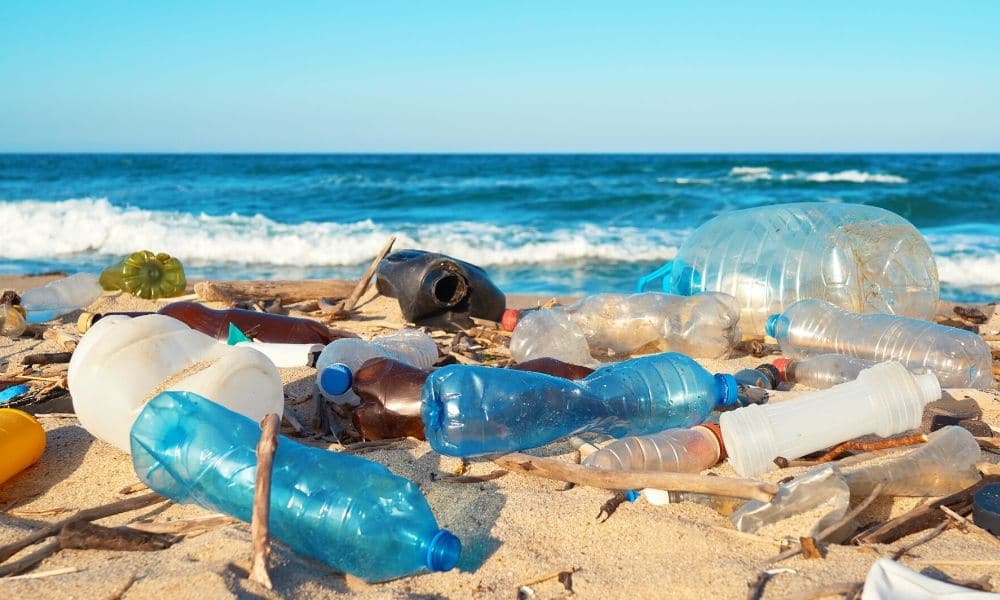Bottled water is a common and popular product in the United States. This is due to both its availability and its taste. Unfortunately, the tap water in many of our homes and offices contains chemicals and metals that create an unpleasant taste—and often a foul smell. As a result, bottled water production is only increasing.
However, just because bottled water has become increasingly popular in recent years doesn’t mean that it’s good for us. In fact, while promising pure and filtered water, many bottled products aren’t much different from the tap water that we try to avoid. To keep yourself and the environment healthy, take a few minutes to learn about the harmful effects of plastic water bottles.
Effects on the Environment
It’s common knowledge that plastic isn’t very good for the environment, but not many realize just how dangerous it can actually be when given the chance. Whether it’s in the manufacturing process or during disposal, these materials can throw ecosystems out of control and create more problems than there are solutions. As such, we must remain aware of these issues so that we can continue to create alternatives and fight back against the plastic epidemic.
Pollution
Pollution is a primary side effect of producing plastic products. The manufacturing process of plastic water bottles alone releases tons of carbon dioxide into the atmosphere each year. As a result, the surrounding oxygen becomes contaminated, making it harder to breathe and, in some regions, even making the residents sick. Over time, the contaminants in the air can make their way into the surrounding soil and water supplies. The toxins are consumed by the lifeforms feeding on these resources and make our agricultural products rich in poisonous materials.
Limited Resources
Manufacturing bottled water also uses up a considerable amount of our precious natural resources—such as oil and water. In regions that are lacking in these resources, this can be detrimental to the local way of life and hinder functioning. As bottled water companies use up increasing amounts of these resources, they begin taking from the water supply that the rest of the world needs to survive. The resources alone that are used in the production of bottled water could run over a million cars or power thousands of homes.
Effects on Animals
Unfortunately, runoff from landfills carries more than just toxins to the oceans and nearby wetlands. Millions of plastic water bottles are also floating in these waters, potentially injuring or killing any animals that encounter them. In many cases, marine life will choke on these sharp material shards. But even if an animal is large enough to consume it, the non-degradable plastic will still often cause their demise. While cleaning these plastic bottles out of our ecosystems is a great place to start, an even better first step is to cut back on how many bottles are thrown away.
Effects on Your Health
The harmful effects of plastic water bottles don’t just reach those living in the wild. Even we humans aren’t immune to some of the dangers. While we want to think that our bottled water is properly filtered and clean, it’s important to acknowledge that they might not all be. Not all bottled water is tested as frequently as tap water, meaning that there could be more in our water than we believe.
Even if your water is filtered properly, it can still contain contaminants from the plastic carrying it. Chemicals such as BPA are commonly found in plastic and can bleed into the water within the bottle. This transference leads to you consuming toxins not meant for consumption, and potentially developing various illnesses as a result. BPA, or bisphenol A, is linked to a list of symptoms including asthma, dizziness, and reproductive issues. That’s why we recommend purchasing reusable water bottles made with metal or glass. These materials won’t contaminate the water their carrying and make it easy to keep your water with you on the go.
Effects on Your Budget
Most of the money spent on bottled water goes towards the creation of the bottle. As such, most of what you’re paying for isn’t even the water itself. Because the focus during this process is on creating the bottle, not much attention is paid to the filtering of the water inside of it. This leads to the presence of contaminants that can make you—and your family—sick.
In addition, bottled water is a non-renewable product that needs to be replaced once each container has been emptied. This continuous cycle of buying more water can cost the average household thousands of dollars each year, taking those funds away from other investments. While many have tried to reuse plastic bottles to conserve additional resources, this can cause you to consume more contaminants from the plastic over time.
On the bright side, there are several alternatives to buying water bottles that can help you save some cash. Simply using a faucet filter can reduce the number of contaminants in your tap water, make it taste better, and give you the convenience you’re looking for. However, quality water coolers are often the best choice to supply you with clean and drinkable water at an established monthly cost for the equipment, installation, and continued care.
Because of these harmful effects, it’s more important now than ever before that we reduce how many plastic water bottles we’re using and disposing of. Fortunately, water filtration technology has advanced enough to help us find alternatives to these hazards. It’s important to us at Drink Meta that you have access to the clean and healthy water you need to get through each day—without the harmful side effects. As such, we set out to provide you with top-notch, bottleless water coolers in New York City. From purified ice to sparkling water, our products can perfectly fit your needs and supply you with water at the touch of your fingertips.

